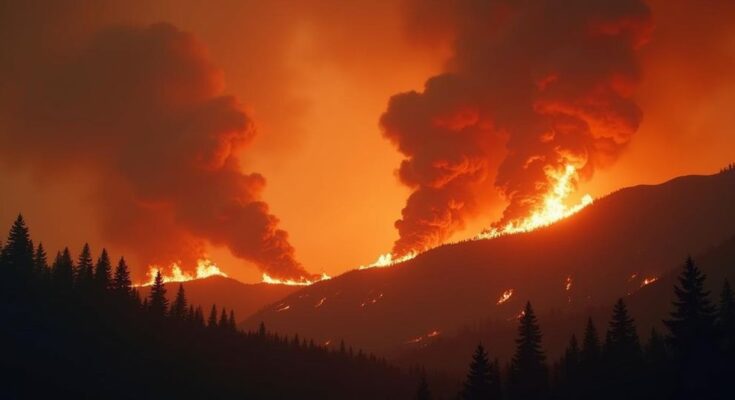The Amazon region in South America faces a severe crisis with rampant wildfires, primarily driven by human activities that have obscured skies and harmed local populations. The increase in severe drought conditions, made worse by climate change and El Niño, has exacerbated these fires across countries including Brazil, Ecuador, Paraguay, and Peru, resulting in significant health issues and ecological damage. Local leaders are urging for immediate action to address these environmental challenges before they escalate further.
The Amazon, a vast expanse of rainforest spanning Brazil, is currently engulfed in a severe environmental crisis characterized by rampant wildfires and devastating smoke. Known for its vibrant blue skies, the Rondônia region has faced an unprecedented surge in smoke resulting from extensive man-made fires. These wildfires have spread across South America, affecting not only Brazil but also neighboring nations such as Ecuador, Paraguay, Peru, and Bolivia. As the blazes ravage vast tracts of land, local populations are grappling with health consequences, including respiratory issues and visibility impairments. Experts attribute the fires to a combination of human activity, historical drought worsened by the El Niño climate phenomenon, and broader climate change impacts. In Rondônia, Porto Velho’s city dwellers are acutely aware of the smoke’s suffocating presence, with health officials noting an alarming increase in patients suffering from respiratory ailments. Dr. Lilian Samara de Melo Lima, a general practitioner in the region, expressed concerns about the unusual severity of this year’s burning season as local ranchers and farmers exploit the Amazon’s forests. The fires extend beyond Brazil, with alarming records of hotspots detected across Colombia, Guyana, and Venezuela as well. Furthermore, Paraguay’s Chaco ecosystem has been severely impacted, with over 180,000 hectares of land scorched since early September, affecting both agriculture and the indigenous Ayoreo community, who rely on these lands for sustenance. In Peru, where at least 20 people have perished due to fires, a state of emergency has been declared across multiple regions. Local authorities attribute these destructive fires largely to illegal agricultural practices exacerbated by changes in land use. Ecuador has also seen its capital, Quito, engulfed in smoke as extraordinary conditions continue for paramedics combating flames in the area. In Bolivia, the situation mirrors that of its neighboring countries, with millions of hectares consumed by flames, prompting national disaster declarations. Notably, health authorities in Porto Velho have expressed concern over the global ramifications of these disasters, underscoring the urgent need for collective action to address these compounded environmental challenges. The stark warnings from local leaders reflect a broader plea for humanity to acknowledge the plight of the planet before it is too late.
The wildfires in South America, primarily in the Amazon region, highlight a significant environmental crisis exacerbated by human activities, including deforestation, land clearing for agriculture, and climate change. The combination of these factors has led to severe droughts and increased fire susceptibility. Increasingly harsh weather conditions linked to global warming have intensified the frequency and severity of wildfires, drawing attention to the urgency of addressing climate change on a broader scale. Indigenous communities and local populations are particularly vulnerable to the repercussions of these wildfires, both environmentally and health-wise. The current situation underscores a dire need for resuscitating the ecological integrity of these natural resources and implementing sustainable land-use practices.
In summary, the current wildfire crisis in South America, particularly in the Amazon region, reflects a deeply concerning environmental emergency that affects millions of lives and potential ecosystems. With human activity triggering widespread devastation, health complications mounting, and natural resources severely threatened, it is imperative that a collective response is sought. Leadership and collaboration across borders are essential to mitigate the damaging effects and to honor the urgent calls for protecting our shared environment. As articulated by health officials, the earth indeed requires urgent attention and action if we are to reverse the harmful trend of destruction prevalent today.
Original Source: www.theguardian.com




